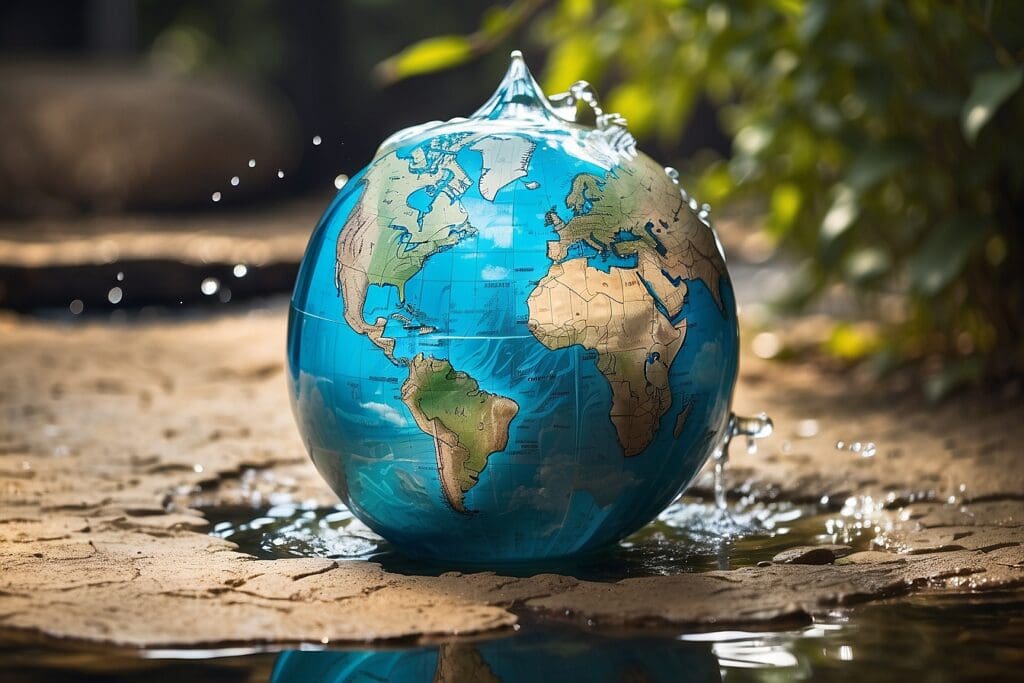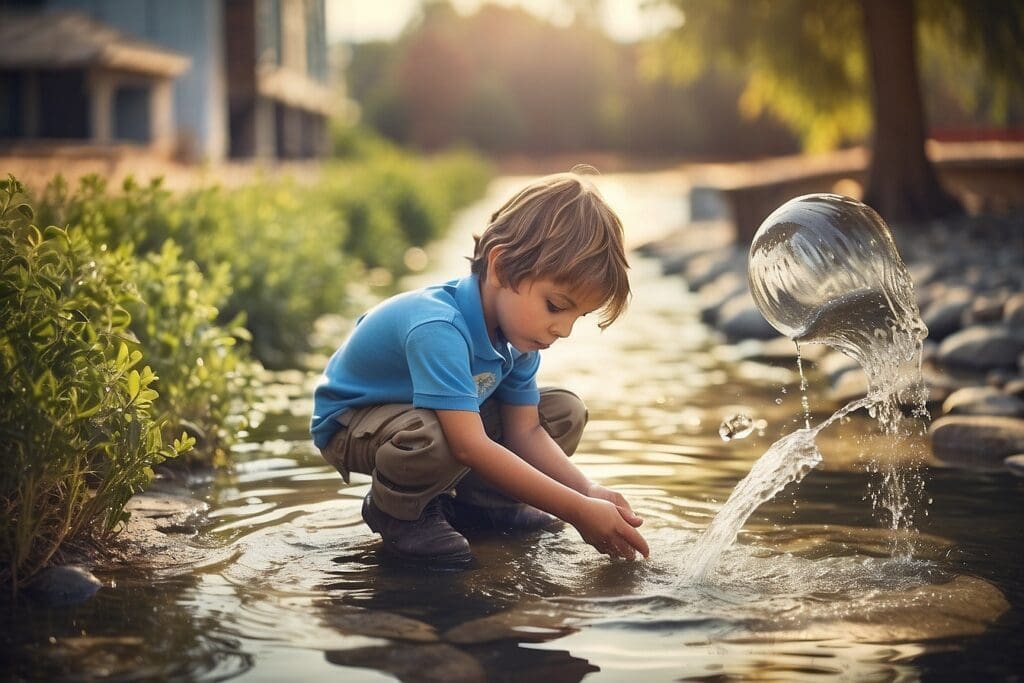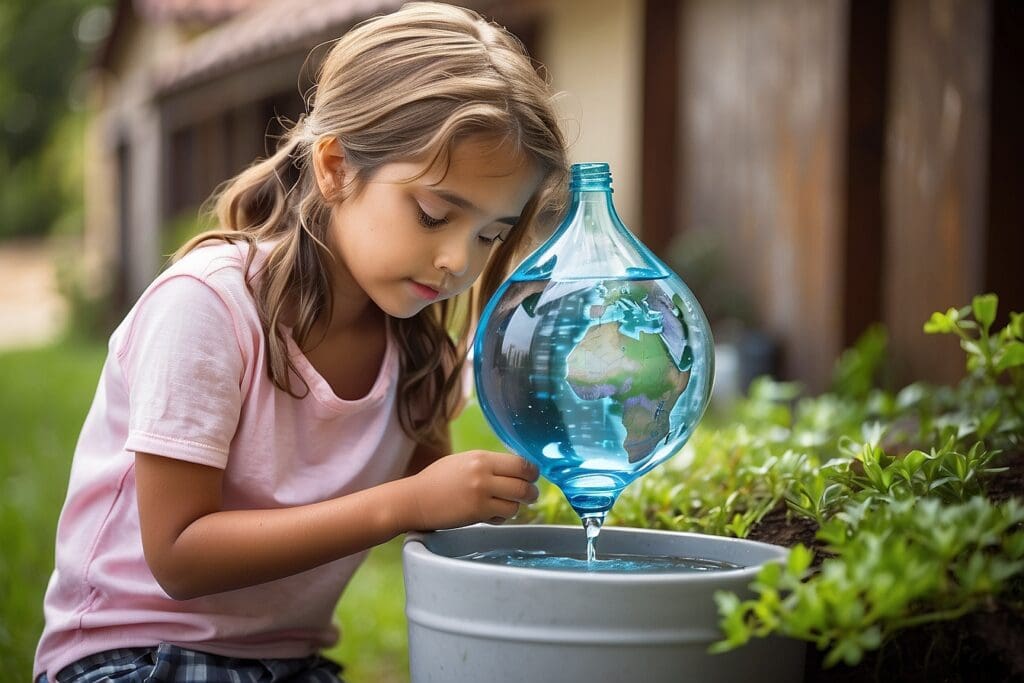Watching the tap run as we brush our teeth, it’s easy to forget that clean water is a finite and precious resource. One alarming fact is that less than 3% of Earth’s water is fresh, with most locked away in glaciers and ice caps.
This blog lends you the practical knowledge to turn every drop into an act of conservation, ensuring not a single one goes to waste. Discover how saving water today can secure our tomorrow.
Key Takeaways
- Water conservation education reduces water waste by teaching individuals and communities to adopt eco-friendly practices, leading to better environmental health and sustainability.
- Public programmes, school curricula, videos, and digital media are essential tools for spreading awareness about the importance of saving water and engaging people in sustainable actions.
- Involving the next generation through responsibility-focused teachings creates a water-smart society that values and actively participates in preserving natural water resources for future use.
- By promoting active citizenry, communities can encourage members to take part in local initiatives and contribute positively towards long-term water sustainability efforts.
- Empowering citizens with knowledge on how everyday actions can impact global water resources furthers the goal of ensuring sufficient clean water for generations to come.
The Value of Water in Our Lives

Water is a vital resource that sustains life, supports ecosystems and powers industries. It is essential for overall environmental stewardship and to appreciate our water sources.
A Vital Resource
Every living thing on Earth relies on water for survival. It’s essential not just for drinking but also for farming, manufacturing and maintaining our natural ecosystems. Without a steady supply of this vital resource, life as we know it would grind to a halt.
Our everyday actions can deplete or pollute our lakes, rivers and oceans, putting all forms of life at risk.
Conservation efforts aim at managing the water cycle efficiently to ensure that future generations inherit a planet with enough clean water. By respecting this precious resource through responsible usage, we play a part in preserving its availability.
Sustainable living starts with each person valuing every drop and recognising the impact they have on global water resources management.
Overall Environmental Stewardship
Protecting our water supply is essential for overall environmental stewardship. This includes conserving water, preventing pollution, and preserving aquatic ecosystems. Responsible water usage also reduces energy consumption and contributes to a healthier planet.
Conserving water not only benefits the environment but also helps to ensure a sustainable future for generations to come. By implementing eco-friendly practices, we can all play a role in safeguarding our precious water resources.
Environmental awareness and active participation are crucial in maintaining a healthy balance with nature.
Appreciation of our Water Sources
After understanding the significance of overall environmental stewardship, it’s crucial to foster an appreciation for our water sources. Generating awareness about the water cycle and the importance of water management promotes eco-friendly practices.
Encouraging an understanding of conservation efforts fosters resource preservation and drought prevention, ultimately contributing to long-term environmental sustainability.
The Role of Education in Driving Water Conservation
Education plays a crucial role in driving water conservation by raising awareness, promoting a water-saving mindset, and encouraging sustainable practices. Through education, individuals can understand the value of water and take active steps to preserve this vital resource.
Raising Awareness
Raising awareness about the importance of water conservation is crucial in fostering a culture of sustainability. By engaging in public education programmes and promoting eco-friendly practices, we can encourage individuals to adopt a water-saving mindset and understand the impact of their actions on the environment.
Through increasing water awareness promotion, we empower communities to take an active role in protecting our precious water sources and reducing water waste.
Furthermore, utilising digital media and informational campaigns helps in spreading knowledge about the water cycle understanding and conservation strategies. This proactive approach enables us to instil conservation awareness among people of all ages, paving the way for a more sustainable future with improved environmental health and long-term water sustainability.
Promoting a Water-Saving Mindset
Promoting a water-saving mindset begins with education and awareness. By integrating water conservation principles into public education programmes and school curriculums, individuals can develop an appreciation for the value of water in their daily lives.
Encouraging eco-friendly practices through digital media and community initiatives further instils a sense of responsibility towards sustainable water usage.
Empowering individuals to embrace a water-saving mindset is essential for reducing water waste and preserving our natural resources. By fostering a culture of mindful consumption, we can build a future generation that prioritises environmental stewardship and actively contributes to long-term water sustainability efforts.
Encouraging Sustainable Practices
- Implementing eco – friendly irrigation methods such as drip irrigation and rainwater harvesting
- Reducing water usage by fixing leaks and using water – efficient fixtures
- Utilising native and drought – resistant plants in landscaping to reduce water consumption
- Adopting eco – friendly practices like composting to enrich soil and reduce the need for watering
- Encouraging responsible use of water through community initiatives and incentives for businesses
- Incorporating greywater systems to recycle water for non-potable purposes
- Promoting the use of water – saving appliances and technologies to minimise wastage
Implementing Water Conservation Education
Public education programs, school education programs, and the use of videos and digital media play a crucial role in spreading awareness about water conservation. To learn more about the impact of water conservation education, keep reading!
Public Education Programs
Public education programmes play a crucial role in spreading awareness and knowledge about water conservation. These initiatives aim to instil a sense of responsibility and action towards preserving our precious water resources, by engaging individuals from all walks of life. Through various creative and interactive methods, public education programmes effectively communicate the importance of eco-friendly practices and environmental stewardship. Here are some key components of these programmes:
- Interactive Workshops: These workshops engage participants in hands-on activities, discussions, and real-life scenarios to deepen their understanding of water conservation strategies.
- Community Outreach Events: Public education programmes organise events within local communities to facilitate open dialogue, share tips for reducing water waste, and encourage sustainable practices.
- Collaborative Partnerships: By collaborating with local businesses, organisations, and government bodies, these programmes create a network that amplifies the impact of their educational efforts.
- Hands-On Demonstrations: Through practical demonstrations such as leak detection exercises or water-saving technologies showcases, these programmes empower individuals with tangible solutions for conserving water.
- Educational Material Distribution: Informative brochures, leaflets, and infographics are distributed widely to raise awareness about the importance of adopting a water-saving mindset in daily activities.
- Engaging Digital Campaigns: Leveraging social media platforms and digital tools helps reach a wider audience by sharing engaging content on water conservation strategies and eco-friendly habits.
School Education Programs
Transitioning from public education programs to school education programs, schools play a crucial role in shaping the next generation’s mindset towards water conservation.
- Incorporating Water Conservation into Curriculum: Schools integrate environmental education and water conservation strategies into their curriculum, ensuring students grasp the significance of preserving natural resources.
- Engaging Classroom Activities: Teachers initiate interactive activities, such as experiments and projects, to cultivate an eco-friendly mindset among students, fostering a hands-on understanding of water-saving practices.
- Installing Water-Efficient Facilities: Schools lead by example, implementing eco-friendly infrastructure such as low-flow faucets and water-efficient systems to demonstrate sustainable practices within their own environment.
- Encouraging Student-Led Initiatives: Educational institutions empower students to take ownership of their role in water conservation efforts through clubs, initiatives, and campaigns focused on reducing water waste and promoting environmental stewardship.
Videos and Digital Media
- Engaging Visuals: Videos and digital media use captivating visuals to illustrate the impact of water waste on the environment, making it easier for viewers to understand and connect with the issue.
- Interactive Learning: These platforms allow for interactive learning experiences, enabling viewers to actively participate in understanding water conservation strategies and their role in preserving natural resources.
- Accessibility: Videos and digital media are easily accessible on various devices, making it convenient for individuals to access educational content on water conservation at any time.
- Innovative Messaging: Through creative storytelling and compelling narratives, videos and digital media deliver persuasive messages that inspire viewers to adopt a water-saving mindset and implement eco-friendly practices.
- Empowering Advocacy: These platforms empower individuals to become advocates for water conservation by sharing informative content with their social circles and promoting active citizenry towards sustainable living.
Advantages of Water Conservation Education

Water conservation education leads to reduced water waste, improved environmental health, and long-term water sustainability. It helps individuals and communities adopt eco-friendly practices for a more sustainable future.
Reduced Water Waste
Water waste reduction is a crucial aspect of water conservation education. By implementing eco-friendly practices and promoting a water-saving mindset, individuals can contribute to reducing water waste at home and in their communities.
Making simple changes like fixing leaky taps, using efficient irrigation systems, and being mindful of water usage during daily activities can collectively lead to significant reductions in water wastage.
Promoting sustainable practices through education not only reduces the strain on our precious water resources but also plays a vital role in building a more environmentally conscious society.
Improved Environmental Health
Water conservation education leads to improved environmental health by reducing pollution and protecting natural habitats. By promoting eco-friendly practices, such as using water-efficient appliances and minimising runoff, it helps maintain the quality of our water sources.
This ultimately contributes to the overall well-being of ecosystems and wildlife.
Furthermore, adopting a water-saving mindset through education supports the preservation of aquatic environments, ensuring their sustainability for future generations. Implementing sustainable water conservation strategies can lead to cleaner rivers and lakes, healthier aquatic life, and reduced contamination risks.
Ultimately, promoting active citizenry in this regard empowers individuals to make a positive impact on their environment.
Long-Term Water Sustainability
Long-term water sustainability requires a collective effort to safeguard our precious water resources for future generations. Implementing water conservation education equips individuals with the knowledge and tools needed to adopt eco-friendly practices, reducing water waste and promoting sustainable water use.
By instilling a deep understanding of the importance of preserving our water sources, we can work towards creating a more responsible and proactive citizenry dedicated to ensuring long-term water sustainability.
Empowering communities with the necessary skills and mindset to conserve and protect our limited water supply is vital for securing a sustainable future. Through active participation in conservation efforts, individuals can contribute positively towards improved environmental health, making a significant impact on long-term water sustainability.
Empowering the Next Generation through Education

Educating the next generation about water conservation instils a sense of responsibility and empowers them to become active citizens in preserving our water sources. By teaching sustainable practices, we can build a water-smart generation that understands the importance of environmental stewardship.
Teaching Responsibility
Teaching responsibility involves instilling a sense of duty towards water conservation. Encouraging individuals to understand their role in preserving this vital resource is key to promoting sustainable practices and reducing water waste.
By educating the next generation about the importance of responsible water usage, we can empower them to make eco-friendly choices, thus ensuring long-term water sustainability.
Imbuing a sense of responsibility towards water conservation equips future generations with the knowledge and values needed to become active citizens in protecting our environment.
Building a Water-Smart Generation
Transitioning from teaching responsibility to building a water-smart generation, the focus shifts towards empowering the future stewards of our planet. By instilling an understanding of the value of water and fostering a sense of responsibility, education plays a crucial role in creating a generation that values and actively participates in water conservation efforts.
Through interactive learning experiences and practical initiatives, young people can develop eco-friendly attitudes and habits that will contribute to sustainable water usage practices.
Encouraging curiosity about environmental challenges and providing opportunities for hands-on involvement empowers young individuals to become proactive agents of change. Educating children about the importance of water conservation not only cultivates responsible behavior but also fosters a deeper appreciation for our shared natural resources.
Promoting Active Citizenry
To promote active citizenry, communities can engage in local water conservation initiatives. Individuals can participate in clean-up events, join community action groups, and advocate for sustainable water use.
By getting involved in local conservation efforts, people can play an active role in protecting and preserving water resources.
Encouraging active citizenship involves empowering individuals to take responsibility for their impact on the environment. Through education and awareness programmes, communities can inspire citizens to adopt eco-friendly practices that contribute to overall water sustainability.
Conclusion
In conclusion, water conservation education plays a crucial role in shaping a sustainable future. By raising awareness and promoting eco-friendly practices, it empowers individuals to become active stewards of the environment.
Embracing a water-saving mindset and reducing water waste are essential strategies for ensuring long-term water sustainability. Through education, we can cultivate a generation committed to responsible and mindful water usage, thus securing the health of our planet for years to come.
FAQs
1. Why is water conservation education important?
Water conservation education helps to promote a water-saving mindset, making people aware of the need for eco-friendly practices and reducing water waste.
2. What can schools teach about conserving water?
Schools can develop strategies to educate students on how to conserve water through everyday actions, helping them understand their role in saving this precious resource.
3. How does educating people about water conservation benefit the environment?
Educating individuals on conserving water leads to widespread ecofriendly practices that collectively contribute to significant reductions in unnecessary water usage and waste.
4. Can learning about water conservation make a difference at home?
Absolutely! Someone who understands the importance of preserving our water supply will be more vigilant about avoiding wastage and implementing simple yet effective watersaving techniques at home.





